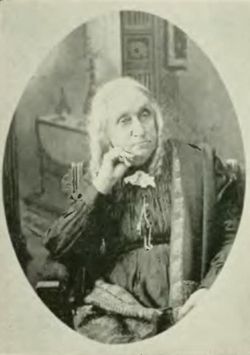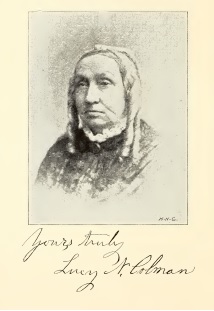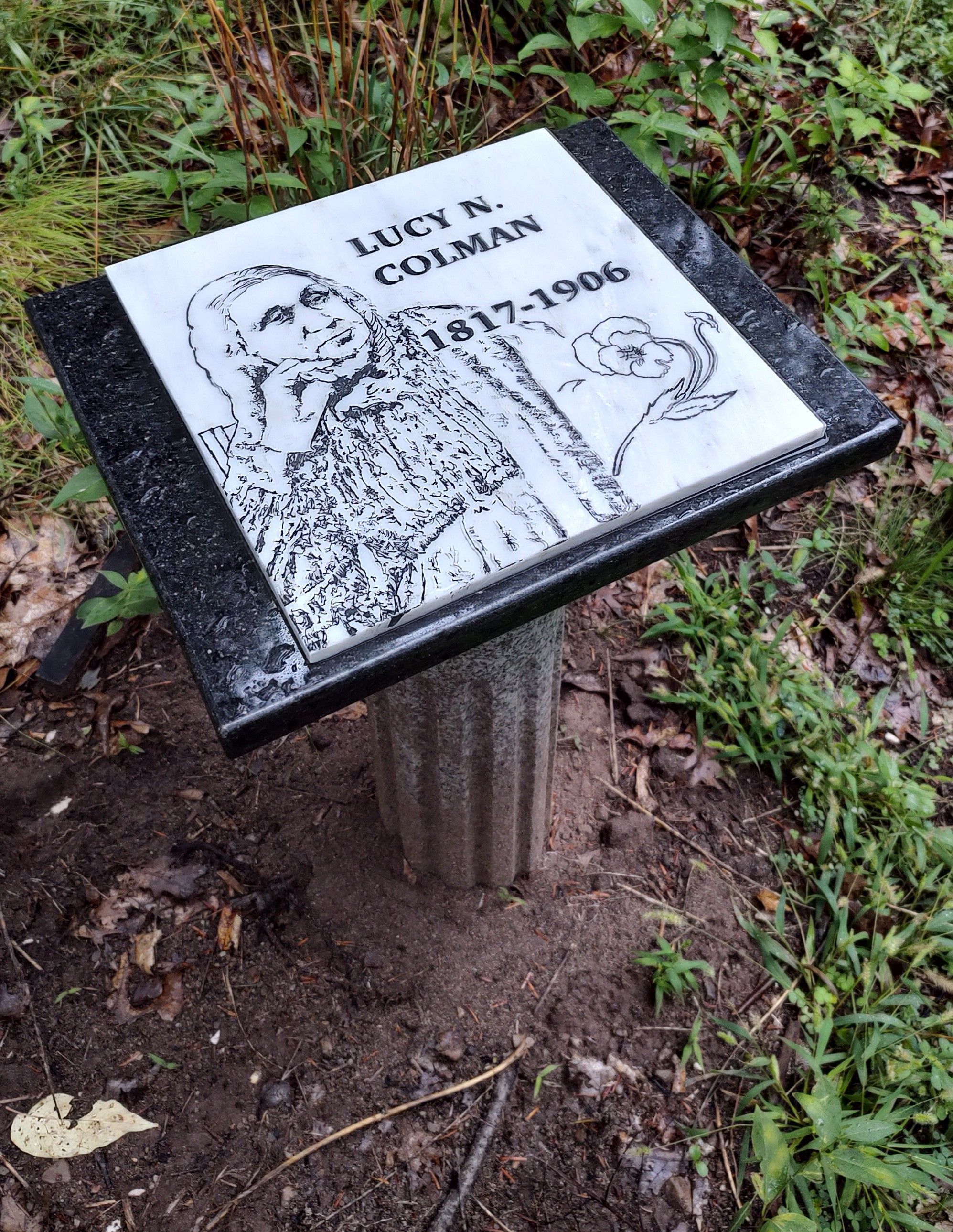The Truth Seeker
Mrs. Lucy N. Colman, whose death in Syracuse, N.Y., has been recorded in The Truth Seeker, was of New England origin, the place of her earliest recollections being the rural districts of Massachusetts, where she was born July 26, 1817. She was brought up under religious influences, but emancipated herself during her young womanhood. At 18 she married John M[aubry] Davis of Dighton, Mass., who six years later fell a victim to New England's "white plague," consumption. Her religion was Universalism, which she shared with him after surviving a scourge of revivalism. Left a widow at twenty-four, she two years later married Luther Colman, and was first a mother at twenty-eight. She had lived a happy married life forgetful of the slave, but motherhood made her an abolitionist, and to the anti-slavery reform she was devoted with Garrison, Phillips, Frederick Douglass, and others, until abolition crowned their work and the slave was freed.
Mrs. Colman gave up the churches because of their complicity with slavery. From Universalism she passed to Spiritualism, and when her husband, who was killed in a railroad accident, was buried from Corinthian Hall, Rochester, N.Y. Andrew Jackson Davis officiated at the funeral. She had renounced even the mild Universalist and Unitarian creeds.
In her widowhood she was for some years a school teacher, and labored --- while in that calling for the abolition of corporal punishment, meeting with encouraging success. Becoming convinced that she ought to speak for the slave, she consulted with her lifelong friend, Amy Post (another honored name in Liberalism), and the two women planned a campaign. Their first meeting was held in a Presbyterian church, and it proved a success; from that time on Mrs. Colman continued in the work. In Michigan, where she labored for a while, she found a home in the Liberal household of Samuel D. Moore and wife.
She found in her experience that everywhere the church was the "bulwark of slavery." When attacked by mobs she discovered that ministers of the gospel were the ringleaders. Her life was an adventurous one. She escaped the fate of some of the abolitionist speakers, but testifies in her "Autobiography" that she smelled the tar and saw the bag containing feathers. Slavery days being over, she devoted herself to the emancipation of women and became a suffragist. She was the more radical the older she grew, and neglected no line of reform. she was not a Spiritualist into in life.
So passes another of those pioneers who in their day mingled with the world among its great characters and did their share to achieve the gains which the present enjoys over the past. Woman who today are approaching equality with man in public and industrial employments and in the exercise of human rights have to thank Lucy N. Colman. In part, for their liberation, from the previous condition of their sex. She had a ringing voice for Liberty, and its echoes are not dead.
Syracuse Herald, January 19, 1906
------
In Syracuse, N.Y. January 18, 1906, Lucy Newhall Colman, aged 88 years and 6 months. Funeral services will take place from the home of her nephew, Frank Raymond, No. 412 Gifford street. Interment at Rochester, N.Y.
Syracuse Herald, January 19, 1906
-------
Lucy N. Colman was the author of the book "Reminiscences", published by H. L. Green, Publishers, Buffalo, NY (1891).
She attended the Woman's National Loyal League convention in New York City in May 1863 where she was secretary with Martha Wright.
She attended the Western Anti-Slavery Society meeting in Cincinnati with Amy Post in 1853 and led a Friends of Human Progress meeting. She lectured in Ohio, Michigan, Indiana and Illinois and worked in a "colored" school in Rochester. Frederick Douglas supported her and asked her to aid the daughter of a runaway.
She left the Universalists because it didn't live up to the high abolitionist standards she espoused. She then became a spiritualist which exalted an individual's self worth.
The Truth Seeker
Mrs. Lucy N. Colman, whose death in Syracuse, N.Y., has been recorded in The Truth Seeker, was of New England origin, the place of her earliest recollections being the rural districts of Massachusetts, where she was born July 26, 1817. She was brought up under religious influences, but emancipated herself during her young womanhood. At 18 she married John M[aubry] Davis of Dighton, Mass., who six years later fell a victim to New England's "white plague," consumption. Her religion was Universalism, which she shared with him after surviving a scourge of revivalism. Left a widow at twenty-four, she two years later married Luther Colman, and was first a mother at twenty-eight. She had lived a happy married life forgetful of the slave, but motherhood made her an abolitionist, and to the anti-slavery reform she was devoted with Garrison, Phillips, Frederick Douglass, and others, until abolition crowned their work and the slave was freed.
Mrs. Colman gave up the churches because of their complicity with slavery. From Universalism she passed to Spiritualism, and when her husband, who was killed in a railroad accident, was buried from Corinthian Hall, Rochester, N.Y. Andrew Jackson Davis officiated at the funeral. She had renounced even the mild Universalist and Unitarian creeds.
In her widowhood she was for some years a school teacher, and labored --- while in that calling for the abolition of corporal punishment, meeting with encouraging success. Becoming convinced that she ought to speak for the slave, she consulted with her lifelong friend, Amy Post (another honored name in Liberalism), and the two women planned a campaign. Their first meeting was held in a Presbyterian church, and it proved a success; from that time on Mrs. Colman continued in the work. In Michigan, where she labored for a while, she found a home in the Liberal household of Samuel D. Moore and wife.
She found in her experience that everywhere the church was the "bulwark of slavery." When attacked by mobs she discovered that ministers of the gospel were the ringleaders. Her life was an adventurous one. She escaped the fate of some of the abolitionist speakers, but testifies in her "Autobiography" that she smelled the tar and saw the bag containing feathers. Slavery days being over, she devoted herself to the emancipation of women and became a suffragist. She was the more radical the older she grew, and neglected no line of reform. she was not a Spiritualist into in life.
So passes another of those pioneers who in their day mingled with the world among its great characters and did their share to achieve the gains which the present enjoys over the past. Woman who today are approaching equality with man in public and industrial employments and in the exercise of human rights have to thank Lucy N. Colman. In part, for their liberation, from the previous condition of their sex. She had a ringing voice for Liberty, and its echoes are not dead.
Syracuse Herald, January 19, 1906
------
In Syracuse, N.Y. January 18, 1906, Lucy Newhall Colman, aged 88 years and 6 months. Funeral services will take place from the home of her nephew, Frank Raymond, No. 412 Gifford street. Interment at Rochester, N.Y.
Syracuse Herald, January 19, 1906
-------
Lucy N. Colman was the author of the book "Reminiscences", published by H. L. Green, Publishers, Buffalo, NY (1891).
She attended the Woman's National Loyal League convention in New York City in May 1863 where she was secretary with Martha Wright.
She attended the Western Anti-Slavery Society meeting in Cincinnati with Amy Post in 1853 and led a Friends of Human Progress meeting. She lectured in Ohio, Michigan, Indiana and Illinois and worked in a "colored" school in Rochester. Frederick Douglas supported her and asked her to aid the daughter of a runaway.
She left the Universalists because it didn't live up to the high abolitionist standards she espoused. She then became a spiritualist which exalted an individual's self worth.
Family Members
Sponsored by Ancestry
Advertisement
Explore more
Sponsored by Ancestry
Advertisement









